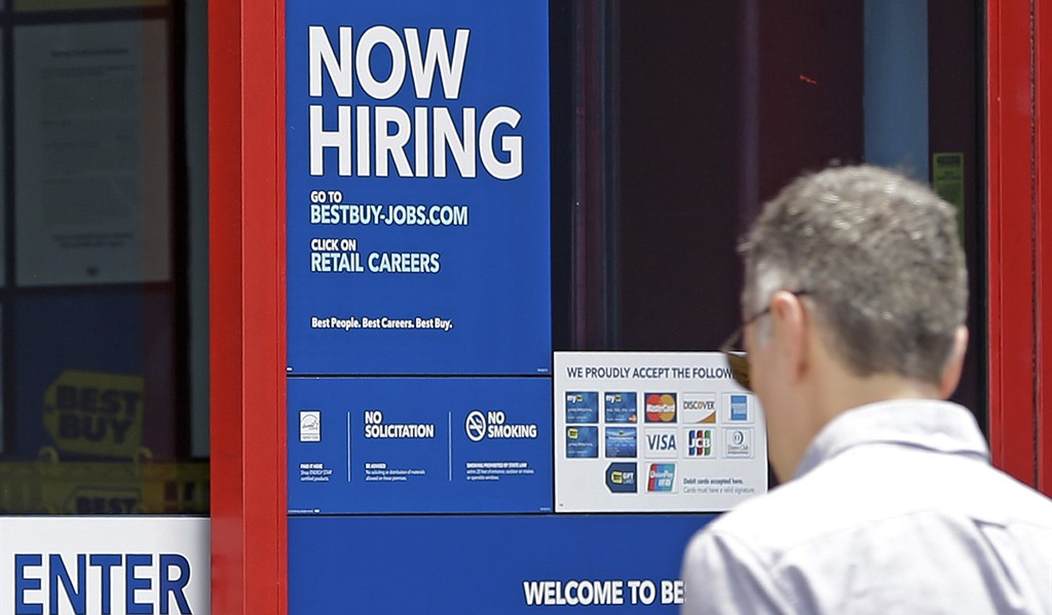Pushing back on recent pro-worker populism on the Right, the American Enterprise Institute's Michael Strain writes that "workers need a growth-and-participation agenda." The addition of the word "participation" to traditional pro-growth ideas is especially important today.
Millions of pages of study and commentary have rightly made the case that economic growth lifts all boats. But while necessary, economic growth without the removal of existing government barriers to work and entrepreneurship won't be sufficient. It can't cure the participation crisis that traps many workers and lower-income Americans.
In addition to the money we make through our jobs, most of us find some intrinsic value in the act of working or from our work community. Of course, some people have excellent reasons not to work, such as the desire to stay home with one's children. But whether we work or not shouldn't be the result of government-created incentives or obstacles.
People on the Left have always been inclined to address poverty and other ills with government benefits, without much worry over their preferred programs' notable, unintended consequences. From the push for higher minimum wages to the implementation of a federal paid-leave program, they often overlook the ways in which these policies generate potential losses of work hours (or even lost jobs), lower wages and reduced prospects for promotion (especially for women). Lately, people on the political Right have joined the same chorus to demand counterproductive proposals.
Recommended
Take the new enthusiasm among some conservatives for universal programs like the extended child tax credit. Due to its remarkable generosity and lack of work or marriage requirements, it could have negative effects on labor-force participation and child poverty similar to those created by the pre-1990s-reform American welfare system. The same is true of other left-wing policy favorites now endorsed by some people on the Right -- namely, industrial policy to boost manufacturing employment and protectionism.
Contrary to how they're sold, these policies will hurt workers without addressing some recent developments that are sources of genuine concern.
Indeed, over the last 20 years, some Americans -- disproportionately working-age men -- have dropped out of the labor force despite low unemployment numbers. In the past, for instance, economic shocks like the Great Recession were followed by increases in unemployment. But as people moved away to find jobs and the economy improved, unemployment returned to lower levels. Not today. This is concerning to scholars and policymakers alike. Now, Americans (especially those who aren't college educated) tend to remain in hard-hit geographic areas, where they stay unemployed.
Unfortunately, Right-leaning populists have been quick to join the Left in blaming the free market for these woes and now demand an expansion of entitlement programs. But all too often, reduced geographic mobility and labor-force participation are the results of the very initiatives for which they're calling.
Take, for instance, the Social Security Disability Insurance program. It was created to support those afflicted with health conditions or injuries that make working difficult or impossible. It continues to serve that role. But scholars find that the program also helps keep many physically able adults with limited earning potential out of the labor market. Men make up a large majority of these would-be workers.
Another set of issues was brought on by the pandemic when numerous policies were enacted precisely to keep people from working. Most notable are paid leave, child tax credits, large individual stimulus "relief" checks and boosted unemployment benefits. Many Americans received more than one of these and found their incomes increased above and beyond what they earned while working. While understandable at first, the effects linger. With the worst of the pandemic behind us, some workers remain reluctant to return to the job market. In this, they're encouraged by politicians who would prefer to keep the handouts flowing permanently.
This situation is unhealthy and fiscally unsustainable. Emergency measures are for emergencies and need to be eliminated when such circumstances pass. That's just a start. Congress must finally remove worker-participation barriers created by long-term government programs. Doing so would lead to more opportunities and better lives for people who have been frozen out of the gains enjoyed by most workers.
While these steps might not be the whole answer, a failure to remove barriers to participation could very well nullify other government efforts to lift people up and increase economic growth. Americans deserve better.

























Join the conversation as a VIP Member